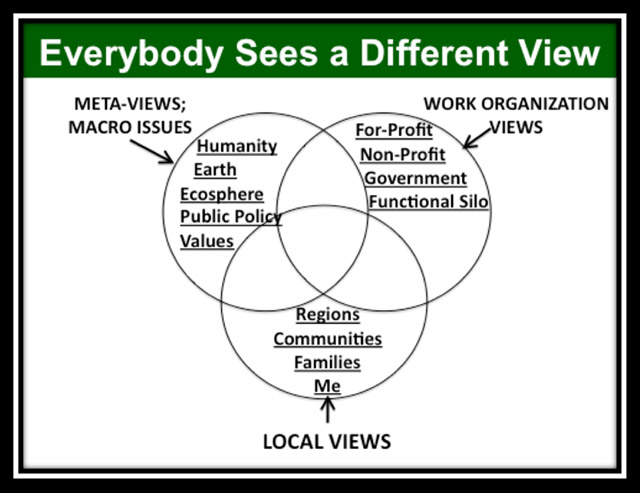October 20, 2010
From tribal wars to functional silo squabbles, rifts among people that don’t understand the world the same way seem to be a normal condition. Even an affinity for multiple human factions at once does not assure that we’re able to agree with each other. Us-and-them games that consume a great deal of human energy only add to the messy complexity of the modern world and distract us from effective action on our common challenges of Compression.
Trying to overcome this runs into human limitations. Each of us is limited by our time and limited scope of attention. Once convinced that a perspective is “right,” we feel obligated to “defend” it. This makes learning to understand different perspectives an emotional stretch as well as an intellectual one. Like every other skill, learning systems thinking and seeing connections takes practice, and unraveling an infinite knot of potential connections exceeds anyone’s capability. All we can do is practice and try our best.
In principle, the need to live without using excess resources is easily grasped, but keeping up with the interrelated threats underpinning that necessity takes more time than any of us have. Consequently, we have to learn how to collectively integrate a big picture of specifics without anyone really grasping all the detail, like a group assembling a jigsaw puzzle when no one can see all the pieces, and no view of the final picture is complete in every detail.
The figure shown barely starts diagramming the diversity of human mind sets, much less the diversity of nature. Investment bankers and forest rangers are apt to have very different ways of thinking. To contemplate Compression, all start from different frames of reference, or mental models of how the world works. To deal with Compression we must barf those up, and just try to comprehend physical reality as best it can be seen or as best a model can represent it. Even then we can never agree on reality, but at least we’re focused on learning the same thing, and resolving disagreement is a means to learn more about it.
This approach is the core of a constitution for learning alluded to in Chapter 6 of Compression. Any constitution is an agreement on how to resolve our differences, among other things. Unless people can agree on a constitution, explicitly or implicitly, fragmentation and endless dispute are inevitable.

